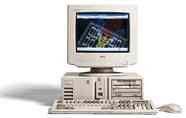
This I/O space is assigned to the standard I/O functions and these assignments go back to the "Start of DOS". See the list of I/O Port assignments at the end of this chapter.
In looking at I/O assignment in the DOS system we must also consider the DMA ports (Direct Memory Access), and the IRQ lines (Interrupt ReQuest) and sometimes memory address space. We will cover DMA and IRQ in other chapters in PC Peripherals. Some I/O functions are also assigned memory space for RAM and/or BIOS Extension ROMs.
It is important to make sure two I/O cards are not trying to use the same I/O assignments.
During this era, basic I/O functions could be supplied by one of two possible combinations
SPG = Serial, Parallel and Games Ports
FDC/IDE = Floppy Disk Drive Interface and IDE Hard Disk Drive Interface
The wheel has turned full circle and today System Boards have all these basic I/O functions built into the System Board. They are provided by the "chip set" the board is built around. The cost of the System Board is usually low when compared to the cost of the processor and the useful life of a modern PC Computer System is only two or three years. It will be very obsolete in two years and not worth replacing with the same level of technology.
| Back to the opening index | Book two index |
| The common I/O port assignments | The PCs Parallel Ports | The PCs Serial (Comms) Ports | The PCs Games (Joystick) Port |